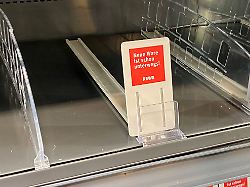Many supermarkets are missing products. If the problem is not solved, there is a risk of further bottlenecks – including when shopping for Christmas.
The black and white pieces of paper are impossible to miss. They hang every two meters on the doors of the large refrigerators, which are filled with, among other things, cold cuts and cheese. The printouts say: “Important information for customers: Unfortunately, due to strikes in our central warehouses, there may be missing items in our range.” The notes are hanging in a Rewe market in Hilden, North Rhine-Westphalia, but they can also be seen in a similar way in other parts of the republic.
Empty shelves have been an everyday occurrence in German supermarkets for months. The effects of strikes in the distribution of goods are felt by customers in many places. The reason is that collective bargaining negotiations between retailers and the Verdi union have been fruitless and deadlocked for months. However, there is no immediate solution in sight. Customers will probably have to live with restrictions for their weekly shopping for longer.
How bad is the situation?
Not dramatic, this is the official communication from food retail companies. There are no bottlenecks, supplies are secured. Only in individual cases are products temporarily unavailable. When asked by Rewe, Edeka & Co., there is hardly any impact on consumers. Everything is under control, according to the message.
From the point of view of trading expert Jörg Funder, this is strategy. “Of course the companies don’t want to admit that the situation is difficult; anything else would be a success for the union,” he says. The companies did not want to make the other side unnecessarily strong or scare off customers, so they deliberately downplayed the situation. Martin Fassnacht, retail expert from the WHU business school, says: “Full shelves arouse the desire to buy and lead to more purchases, empty ones put customers in a bad mood and they buy less.”
While the headquarters of Rewe, Aldi & Co remain silent on detailed questions, the local retailers are more willing to provide information. The effects of the strike are serious, there are major problems with the supply of goods, says a dealer who runs several branches in the greater Dortmund area. He prefers not to be quoted by name because otherwise he could get into trouble with his regional company.
How are retailers reacting?
Because the drivers who drive the goods to his markets are on strike, the trader from Dortmund books a shipping company. This means that he incurs extra costs, but at least he gets a large part of his goods. The situation is still critical, and the bottlenecks are partly similar to those during the Corona period. Especially for products that were selling well, the shelves were completely empty after three days.
He doesn’t believe in notices in his markets. “That looks scary.” He cannot order and store more goods. Its capacities and cooling space are limited, and the best-before dates for fresh products do not allow it. That’s why he depends on new goods to arrive. He does not expect the collective bargaining dispute to be resolved this year. “We’ll have to live with the gaps for a while.”
Another dealer from North Rhine-Westphalia is also angry about the situation. For him, it’s not the drivers who are on strike, but the order pickers in the warehouse who are responsible for putting together the ordered goods. This has even more drastic consequences for him. Often only 20 roll containers reached his market per day instead of the usual 60.
The result is gaps on the shelf, across the entire range. He can no longer order or receive supplies directly from manufacturers. The customers understand the situation, but they are still angry if they don’t get their favorite cereal. He didn’t put any notices up in his shop. They gave the impression that only the union was to blame for the situation. He doesn’t think that’s right. When asked about the communication of food retail companies, he said: “They downplay the problems.”
Which products are affected?
According to expert Funder, bottlenecks often occur, especially for products with a short lifespan such as fruit, vegetables, meat and frozen goods. Strikes have been going on for months in different forms and with varying intensity depending on the federal state. Sometimes the strikes lasted a few hours, sometimes they lasted for days. Warehouses and logistics are particularly affected, which means that pickers and drivers are often missing. According to Verdi, North Rhine-Westphalia and Bavaria are particularly affected. In North Rhine-Westphalia, Edeka and Rewe warehouse locations have been on strike again since last week.
According to Funder, how badly customers are affected also depends on where they live. In rural areas and in smaller medium-sized cities, where there are often only small and medium-sized branches with less storage space, the gaps in the shelves are often more visible.
What is being argued about?
Verdi is demanding at least 2.50 euros more per hour for the 3.2 million retail workers and a term of one year. The employer side offers an increase of up to 1.78 euros and an inflation compensation bonus of 750 euros – with a term of two years. Since May, around 60 regional negotiations have been unsuccessful. Most recently, the employers canceled the negotiations.
On Thursday, the German Trade Association (HDE) and the Verdi union met in Berlin for a top-level discussion and agreed on how to proceed. Negotiations at the state level should now be resumed. If an agreement is not reached soon, there may even be a risk of more severe strikes. This would be particularly painful for consumers. “At Christmas the family comes together and wants to treat themselves to something, for example a good roast. The customer has no understanding if it is not available,” says trade expert Fassnacht.
